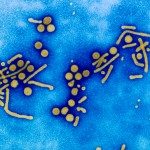Link to Pubmed [PMID] – 25455349
J Psychiatry Neurosci 2015 May;40(3):151-61
BACKGROUND: Alzheimer disease is characterized by cognitive decline, senile plaques of β-amyloid (Aβ) peptides, neurofibrillary tangles composed of hyperphosphorylated τ proteins and neuronal loss. Aβ and τ are useful markers in the cerebrospinal fluid (CSF). C-Jun N-terminal kinases (JNKs) are serine-threonine protein kinases activated by phosphorylation and involved in neuronal death.
METHODS: In this study, Western blots, enzyme-linked immunosorbent assay and histological approaches were used to assess the concentrations of Aβ, τ and JNK isoforms in postmortem brain tissue samples (10 Alzheimer disease and 10 control) and in CSF samples from 30 living patients with Alzheimer disease and 27 controls with neurologic disease excluding Alzheimer disease. Patients with Alzheimer disease were followed for 1-3 years and assessed using Mini-Mental State Examination scores.
RESULTS: The biochemical and morphological results showed a significant increase of JNK3 and phosphorylated JNK levels in patients with Alzheimer disease, and JNK3 levels correlated with Aβ42 levels. Confocal microscopy revealed that JNK3 was associated with Aβ in senile plaques. The JNK3 levels in the CSF were significantly elevated in patients with Alzheimer disease and correlated statistically with the rate of cognitive decline in a mixed linear model.
LIMITATIONS: The study involved different samples grouped into 3 small cohorts. Evaluation of JNK3 in CSF was possible only with immunoblot analysis.
CONCLUSION: We found that JNK3 levels are increased in brain tissue and CSF from patients with Alzheimer disease. The finding that increased JNK3 levels in CSF could reflect the rate of cognitive decline is new and merits further investigation.
